Laura Perry's Blog, page 22
January 14, 2015
Book Review: Elen of the Ways
Shamanism - that's the strange thing that people used to do a long time ago in Siberia, right? It doesn't exist any more, right? Wrong.
If you're interested in shamanism, there are multiple ways to approach the practice, and books are more accessible for many folks than workshops and classes. If you're like me and your heart calls to a particular part of the world, perhaps one of the places your
If you're interested in shamanism, there are multiple ways to approach the practice, and books are more accessible for many folks than workshops and classes. If you're like me and your heart calls to a particular part of the world, perhaps one of the places your
Published on January 14, 2015 05:34
January 7, 2015
Who were the Minoans' neighbors?
Today's post over at the Minoan Path Blog is a bit of a history lesson. Sometimes it's hard to get our minds around ancient civilizations and their timelines - after all, they all happened so long ago, what does it matter whether one was earlier than another? Well, it does matter, because our assumptions about those ancient cultures color our views of them, and not always in accurate ways.
Published on January 07, 2015 06:52
December 31, 2014
Book Review: Voices of the Sacred Feminine
Today I'm reviewing a lovely book that really captures the essence of the Goddess Spirituality movement and makes it meaningful for people - both women and men - in ordinary life. I enjoyed talking with the author on her radio show a few weeks back about Minoan spirituality and its egalitarian values. This book emphasizes similar values and gives a wide variety of interesting viewpoints.
Published on December 31, 2014 04:44
December 24, 2014
Christmas with Dionysos
You've probably seen those memes that list a number of gods who were born at Midwinter and whose attributes coincide with the Christian tale of Jesus' birth. Today I'd like to tell you about one of those gods in particular: Dionysos.
Young Dionysos on a satyr's shoulders
Click the link below to read my post on the Minoan Path blog at PaganSquare:
Christmas with Dionysos
I wish you all a
Young Dionysos on a satyr's shoulders
Click the link below to read my post on the Minoan Path blog at PaganSquare:
Christmas with Dionysos
I wish you all a
Published on December 24, 2014 05:50
December 17, 2014
As Solstice Dawns in Knossos
Travel with me, across the world and back in time, to a Winter Solstice morning in ancient Crete...
The Throne Room in the ancient Minoan temple at Knossos
Today's Minoan Path blog post takes us back to the dawning of the Winter Solstice at Knossos many generations ago. Join the others gathered in the temple plaza, awaiting the miracle of Midwinter. Click the link below to read the post.
The Throne Room in the ancient Minoan temple at Knossos
Today's Minoan Path blog post takes us back to the dawning of the Winter Solstice at Knossos many generations ago. Join the others gathered in the temple plaza, awaiting the miracle of Midwinter. Click the link below to read the post.
Published on December 17, 2014 05:42
December 10, 2014
Season of Trees
Ever since I was a small child, the Christmas tree has symbolized the winter holiday season to me. More than Santa, more than caroling, more than the nativity scenes that were scattered all over the town I grew up in, it's the tree that encapsulates the whole season. Why is that? What deep memory does this image speak to?
 Our tree this yearI remember my first priestess telling me the 'Christmas tree lore' from her Irish Pagan tradition. She insisted that the Christmas tree was invented by the Irish when the Brehons (the elders who acted as arbitrators within the community) insisted that local residents tie packets of food to trees at crossroads so winter travelers wouldn't go hungry. Funny how everyone wants *their* tradition to be the one that came up with the idea of the Christmas tree.
Our tree this yearI remember my first priestess telling me the 'Christmas tree lore' from her Irish Pagan tradition. She insisted that the Christmas tree was invented by the Irish when the Brehons (the elders who acted as arbitrators within the community) insisted that local residents tie packets of food to trees at crossroads so winter travelers wouldn't go hungry. Funny how everyone wants *their* tradition to be the one that came up with the idea of the Christmas tree.
I've also spent a lot of time listening to people argue about whether the Christmas (Yuletide/holiday/etc.) tree is a Pagan symbol that shouldn't be used by 'proper, God-fearing Christians' (not that I've ever been one of those). I even had one very sincere woman tell me that you can suss out the closet Pagans because they use live trees; apparently, in her world, Christians stick with artificial trees.
Come on, people, you're missing the point. It's a symbol that works. It evokes something very old yet still very relevant, even for folks who don't ascribe any religious meaning to the winter holidays. So what deep part of our collective memory does the Christmas tree tickle?
I find it interesting that the Christmas tree seems to overlap in the collective psyche with the birth of the baby Jesus, even though there's no mention in the Bible of trees of any sort associated with the birth scene. But trees are associated with divine births throughout the ancient world. Certain trees on the island of Crete, for instance, were revered as the birthplaces of deities, and pregnant women brought offerings to the trees in hopes of a safe and swift delivery.
One of my favorite deities, Dionysus, has a double birth story. The Minoan earth-mother goddess Rhea is said to have birthed him in her cave on Mt. Dikte, but he is also recorded as having been born beneath a pine tree, with a star in the sky directly above alerting the world to his arrival. Hmmm.
Modern Pagans tend to celebrate the rebirth of the Sun at Winter Solstice, weaving the scientific knowledge of the cosmos with the age-old mythos of seasonal renewal. Steven Posch recently shared a great blog post about birth trees that speaks to this subject.
But there's more to the Christmas tree than just the birth of a deity or the renewal of the Earth's seasonal cycles. There's a deeper Mystery here, a different kind of birth. You see, the tree is the World Axis. That's right.
Dionysos can show us how it works. In his earliest form he's a shamanic deity, a walker-between-the-worlds who helps us do likewise. To lead us to the Otherworld and its Mysteries, he grasps a low branch, heaves himself up and gestures for us to follow suit. We climb the tree, aiming for the star that is the doorway to the next world - the Pole Star, the nail that holds up the Heavens, the post on which the Cosmic Mill turns. And when we are ready to return from the transformational experience, the journey to the Otherworld, we climb back down the tree, birthing ourselves back into this world.
So when you look at your holiday tree, no matter what you call it (or whether you call it anything at all) know that you've found the center of the universe. And for this season at least, that door is open if you'd care to follow Dionysos on his journeys.
 Our tree this yearI remember my first priestess telling me the 'Christmas tree lore' from her Irish Pagan tradition. She insisted that the Christmas tree was invented by the Irish when the Brehons (the elders who acted as arbitrators within the community) insisted that local residents tie packets of food to trees at crossroads so winter travelers wouldn't go hungry. Funny how everyone wants *their* tradition to be the one that came up with the idea of the Christmas tree.
Our tree this yearI remember my first priestess telling me the 'Christmas tree lore' from her Irish Pagan tradition. She insisted that the Christmas tree was invented by the Irish when the Brehons (the elders who acted as arbitrators within the community) insisted that local residents tie packets of food to trees at crossroads so winter travelers wouldn't go hungry. Funny how everyone wants *their* tradition to be the one that came up with the idea of the Christmas tree.I've also spent a lot of time listening to people argue about whether the Christmas (Yuletide/holiday/etc.) tree is a Pagan symbol that shouldn't be used by 'proper, God-fearing Christians' (not that I've ever been one of those). I even had one very sincere woman tell me that you can suss out the closet Pagans because they use live trees; apparently, in her world, Christians stick with artificial trees.
Come on, people, you're missing the point. It's a symbol that works. It evokes something very old yet still very relevant, even for folks who don't ascribe any religious meaning to the winter holidays. So what deep part of our collective memory does the Christmas tree tickle?
I find it interesting that the Christmas tree seems to overlap in the collective psyche with the birth of the baby Jesus, even though there's no mention in the Bible of trees of any sort associated with the birth scene. But trees are associated with divine births throughout the ancient world. Certain trees on the island of Crete, for instance, were revered as the birthplaces of deities, and pregnant women brought offerings to the trees in hopes of a safe and swift delivery.
One of my favorite deities, Dionysus, has a double birth story. The Minoan earth-mother goddess Rhea is said to have birthed him in her cave on Mt. Dikte, but he is also recorded as having been born beneath a pine tree, with a star in the sky directly above alerting the world to his arrival. Hmmm.
Modern Pagans tend to celebrate the rebirth of the Sun at Winter Solstice, weaving the scientific knowledge of the cosmos with the age-old mythos of seasonal renewal. Steven Posch recently shared a great blog post about birth trees that speaks to this subject.
But there's more to the Christmas tree than just the birth of a deity or the renewal of the Earth's seasonal cycles. There's a deeper Mystery here, a different kind of birth. You see, the tree is the World Axis. That's right.
Dionysos can show us how it works. In his earliest form he's a shamanic deity, a walker-between-the-worlds who helps us do likewise. To lead us to the Otherworld and its Mysteries, he grasps a low branch, heaves himself up and gestures for us to follow suit. We climb the tree, aiming for the star that is the doorway to the next world - the Pole Star, the nail that holds up the Heavens, the post on which the Cosmic Mill turns. And when we are ready to return from the transformational experience, the journey to the Otherworld, we climb back down the tree, birthing ourselves back into this world.
So when you look at your holiday tree, no matter what you call it (or whether you call it anything at all) know that you've found the center of the universe. And for this season at least, that door is open if you'd care to follow Dionysos on his journeys.
Published on December 10, 2014 05:09
December 3, 2014
Southern Hospitality: Thou Art God/dess
I grew up in the American South, a region that has its own set of social rules distinct from the rest of the country. Much of this tradition comes from the Irish and Scottish settlers who filled the Appalachian region and brought their Celtic lifeways to the New World. Let me tell you about some of the customs I’m familiar with, then I’ll explain why we follow them and why they have spiritual significance, especially for Pagans.
One of the first bits of Southern hospitality I learned as a child is this: if I go over to someone’s house, especially during the holidays, they’re going to offer me food and drink. They’re not trying to show me up or ruin my diet; they’re being hospitable. I learned early on that I mustn’t insult them by refusing what they offer, though it’s perfectly acceptable to have only a small serving.
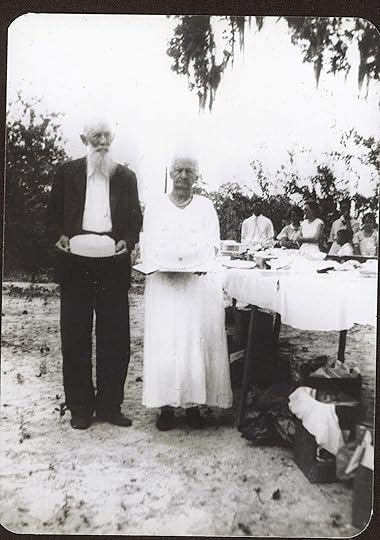 My great-grandparents, Jonathan and Martha Dukes,
My great-grandparents, Jonathan and Martha Dukes,
displaying Southern hospitality at the celebration
of their 50th wedding anniversary
If someone brings food over to my house when my family is in distress (say, during an illness or after a death in the family) I will always return the carefully-cleaned dish as soon as possible. What’s more, I’m honor-bound to make sure I don’t return it empty. It may contain an item as simple as a card with a favorite recipe or a small container of herbs or spices, but the rules of Southern hospitality dictate that it must contain something.
If a friend or neighbor does me a favor – helps me dig up a garden bed or looks after my pets while I’m away, for instance – I will be sure to provide some kind of offering in thanks to them. For a small favor I might give them a loaf of my homemade pumpkin bread. A larger act of kindness might inspire me to have them over for dinner or make them up a gift basket filled with items I know they would like.
One of the more unusual bits of old-fashioned Southern hospitality, and one that is dying out in the modern age, comes directly from the Old World: if I’m out in the park having a picnic and someone comes along and greets me, even if the person is a stranger, I might feel obliged to invite them to join me in my meal. Why on earth would I do such a thing?
The Celts believed that the gods walk the earth among mortal humans on a regular basis, taking the guise not just of ordinary people but of the lowest among us – beggars, tramps, wanderers. If I were to turn someone away and refuse to feed them, not only would I be guilty of a lack of compassion, I might also be directly slighting the gods themselves.
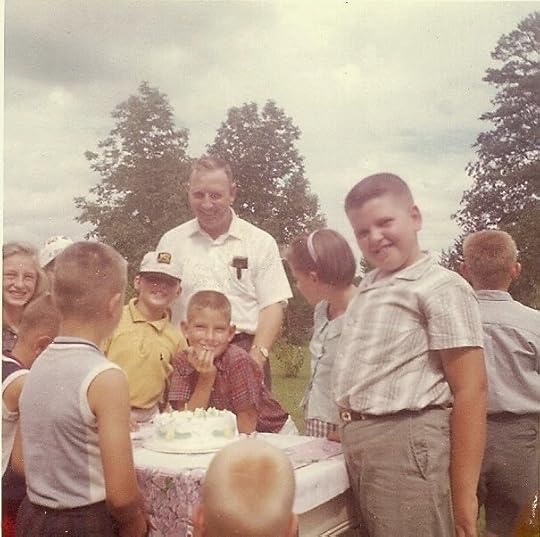 A bit of Southern hospitality
A bit of Southern hospitality
at my husband's ninth birthday party
So you see, it’s not about ‘evening the score’ or making sure you don’t owe anything to anyone; it’s about generosity and sharing, and about recognizing the deity in each and every person. What if the friend who came over to your house really was a goddess? How would you treat her? What if the neighbor who helped you trim that tree really was a god? And especially, what if the homeless person in the park was a deity in disguise? How would your response to them be different than if they were a mere mortal?
The phrase ‘thou art God’ may have been popularized by the novel Stranger in a Strange Land by Robert Heinlein but it incorporates a much older concept: each and every one of us carries the spark of the divine within us. My favorite book that incorporates these concepts is set in Ireland: The Hounds of the Morrigan by Pat O'Shea. In Ms. O'Shea's story, the gods really do walk alongside ordinary humans (kids, in fact) in the guise of ragged tramps, and they have plenty to teach about the difference between what someone appears to be and what they really are inside.
The rules of Southern hospitality simply remind us to behave as if we remember that fact. And it’s a good thing to remember, don’t you think?
One of the first bits of Southern hospitality I learned as a child is this: if I go over to someone’s house, especially during the holidays, they’re going to offer me food and drink. They’re not trying to show me up or ruin my diet; they’re being hospitable. I learned early on that I mustn’t insult them by refusing what they offer, though it’s perfectly acceptable to have only a small serving.
 My great-grandparents, Jonathan and Martha Dukes,
My great-grandparents, Jonathan and Martha Dukes,displaying Southern hospitality at the celebration
of their 50th wedding anniversary
If someone brings food over to my house when my family is in distress (say, during an illness or after a death in the family) I will always return the carefully-cleaned dish as soon as possible. What’s more, I’m honor-bound to make sure I don’t return it empty. It may contain an item as simple as a card with a favorite recipe or a small container of herbs or spices, but the rules of Southern hospitality dictate that it must contain something.
If a friend or neighbor does me a favor – helps me dig up a garden bed or looks after my pets while I’m away, for instance – I will be sure to provide some kind of offering in thanks to them. For a small favor I might give them a loaf of my homemade pumpkin bread. A larger act of kindness might inspire me to have them over for dinner or make them up a gift basket filled with items I know they would like.
One of the more unusual bits of old-fashioned Southern hospitality, and one that is dying out in the modern age, comes directly from the Old World: if I’m out in the park having a picnic and someone comes along and greets me, even if the person is a stranger, I might feel obliged to invite them to join me in my meal. Why on earth would I do such a thing?
The Celts believed that the gods walk the earth among mortal humans on a regular basis, taking the guise not just of ordinary people but of the lowest among us – beggars, tramps, wanderers. If I were to turn someone away and refuse to feed them, not only would I be guilty of a lack of compassion, I might also be directly slighting the gods themselves.
 A bit of Southern hospitality
A bit of Southern hospitalityat my husband's ninth birthday party
So you see, it’s not about ‘evening the score’ or making sure you don’t owe anything to anyone; it’s about generosity and sharing, and about recognizing the deity in each and every person. What if the friend who came over to your house really was a goddess? How would you treat her? What if the neighbor who helped you trim that tree really was a god? And especially, what if the homeless person in the park was a deity in disguise? How would your response to them be different than if they were a mere mortal?
The phrase ‘thou art God’ may have been popularized by the novel Stranger in a Strange Land by Robert Heinlein but it incorporates a much older concept: each and every one of us carries the spark of the divine within us. My favorite book that incorporates these concepts is set in Ireland: The Hounds of the Morrigan by Pat O'Shea. In Ms. O'Shea's story, the gods really do walk alongside ordinary humans (kids, in fact) in the guise of ragged tramps, and they have plenty to teach about the difference between what someone appears to be and what they really are inside.
The rules of Southern hospitality simply remind us to behave as if we remember that fact. And it’s a good thing to remember, don’t you think?
Published on December 03, 2014 05:14
November 25, 2014
Thanksgiving - Minoan Style
Today's Minoan Path blog focuses on the harvest festival aspect of Thanksgiving. Even though the U.S. holiday is a fairly recent invention, the concept goes back to very early times.
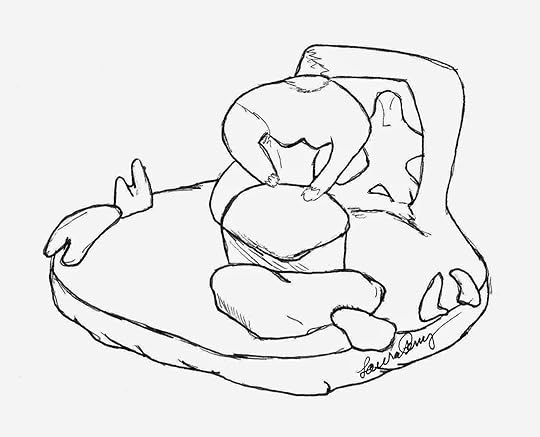 Making bread for a sacred festival
Making bread for a sacred festival
Pottery figurine from the cemetery at Kamilari, Crete
Line drawing by Laura Perry
Discover how the ancient Minoans celebrated the harvest, from the early times of scattered settlements to the glory days of the great temples, and consider how you might bring these sacred aspects into the modern Thanksgiving feast:
Thanksgiving - Minoan StyleFor more information about modern Minoan Paganism, come join the discussion on Facebook at Ariadne's Tribe.
 Making bread for a sacred festival
Making bread for a sacred festivalPottery figurine from the cemetery at Kamilari, Crete
Line drawing by Laura Perry
Discover how the ancient Minoans celebrated the harvest, from the early times of scattered settlements to the glory days of the great temples, and consider how you might bring these sacred aspects into the modern Thanksgiving feast:
Thanksgiving - Minoan StyleFor more information about modern Minoan Paganism, come join the discussion on Facebook at Ariadne's Tribe.
Published on November 25, 2014 05:10
November 17, 2014
Chamber of Music: literature for charity
Some of my friends have put together their second annual short story anthology, with the proceeds once again going to charity.
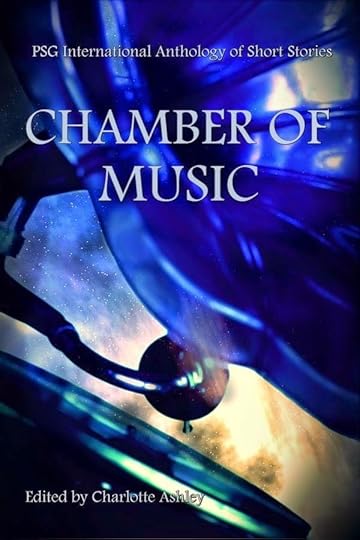
Chamber of Music is a collection of thirteen short stories that focus on the theme of music in one way or another. Music in all its forms is such a fundamental facet of humanity, everyone can relate to it. You don't play an instrument, you say? Well, I bet you hum or whistle or even drum on your desk. Music is in our blood, our bones. It's part of what makes us human.
All the proceeds from the sales of this book go to Musicians without Borders, an amazing nonprofit organization that uses music to bring people together in strife-ridden regions of the world. What better way to remind people that we're all 'us' instead of 'us vs. them' than music?
The fun thing about this particular anthology is the wide variety of genres and 'flavors' the stories represent. The authors hail from seven different countries and have unique perspectives on life. I spoke with three of the contributors to find out a little more about what inspired their stories.
J.B. Roger clued me in to the inspiration for her story, Song to the Moon: "Mine is inspired by my own singing and performing experiences. I am a musician and teacher for many years. I have played with orchestras, also conducted and sang with a choir and had classical singing lessons from the choir director. I was asked to do solos for a concert and then performed solo regularly in concerts as both Alto and Soprano. The relationships in the story are entirely fictional, I hasten to add here!!! Rusalka's aria is one of several I learnt but never had the chance to perform in concert as the choir disbanded. I am now singing again after a break of several years so you never know!"
C.M. Rosens talked to me about her tale, The Snake Charmer's Pipe : "I was inspired by a secondary character (Emine Kelebek) who appears in the second novel of my dark fantasy series. She's one of the children who get abducted by a Faerie Queen but manages to escape - as I was only following the story of one of the children I left the endings of the other escapees open. It was a chance for me to pay homage to my Turkish roots with the setting and flavour of the story, and explore one of those untold tales." You can find more of her writing on her blog and on Facebook here and here. Sample her writing on Wattpad, where she is CelticRose and CelticMedusa, and follow her on Twitter @CMRosens.
Natasha Rowlin gave me some insights into her anthology contribution, The Cello Room: "Writing The Cello Room enabled me to integrate two important parts of my life - music and movement. My inspiration for Amelia stemmed from my experiences working in physical rehabilitation, and seeing how a seemingly trivial skill to one person could be utterly essential and life-altering to another. I grew up with music, loved it with a passion in my youth and then gradually let it slide with the assumption I could easily pick up where I left off one day if I so wished. But through my work, I came to wonder what it would be like if that choice was taken away? Thus Amelia's story came into being. She is not scarred, disfigured, disabled or even emotionally traumatised. She has lost one small ability, her musical gift, which nonetheless has changed her life." You can find out more about Natasha on her website and follow her on Twitter @womaninsydney. You can sample more of her writings on Wattpad, where she is known as WomanInSydney.
For more information about Chamber of Music and to purchase your own copy, have a look here. The anthology is available worldwide in e-book and paper formats. You can also keep up with PSG Publishing on Facebook and Goodreads so you'll have advance notice of each year's charity anthology, along with giveaways and other fun stuff. And if you happened to miss last year's anthology, you can find out about Library of Dreams as well - it's still available worldwide in all your favorite formats.
The winter holidays are coming up and I bet you have friends and family members who love to read. What better way to give them a present and make a gift to the world as well - remember, all proceeds go to Musicians without Borders. You can also donate directly to the charity through their website. Happy reading!

Chamber of Music is a collection of thirteen short stories that focus on the theme of music in one way or another. Music in all its forms is such a fundamental facet of humanity, everyone can relate to it. You don't play an instrument, you say? Well, I bet you hum or whistle or even drum on your desk. Music is in our blood, our bones. It's part of what makes us human.
All the proceeds from the sales of this book go to Musicians without Borders, an amazing nonprofit organization that uses music to bring people together in strife-ridden regions of the world. What better way to remind people that we're all 'us' instead of 'us vs. them' than music?
The fun thing about this particular anthology is the wide variety of genres and 'flavors' the stories represent. The authors hail from seven different countries and have unique perspectives on life. I spoke with three of the contributors to find out a little more about what inspired their stories.
J.B. Roger clued me in to the inspiration for her story, Song to the Moon: "Mine is inspired by my own singing and performing experiences. I am a musician and teacher for many years. I have played with orchestras, also conducted and sang with a choir and had classical singing lessons from the choir director. I was asked to do solos for a concert and then performed solo regularly in concerts as both Alto and Soprano. The relationships in the story are entirely fictional, I hasten to add here!!! Rusalka's aria is one of several I learnt but never had the chance to perform in concert as the choir disbanded. I am now singing again after a break of several years so you never know!"
C.M. Rosens talked to me about her tale, The Snake Charmer's Pipe : "I was inspired by a secondary character (Emine Kelebek) who appears in the second novel of my dark fantasy series. She's one of the children who get abducted by a Faerie Queen but manages to escape - as I was only following the story of one of the children I left the endings of the other escapees open. It was a chance for me to pay homage to my Turkish roots with the setting and flavour of the story, and explore one of those untold tales." You can find more of her writing on her blog and on Facebook here and here. Sample her writing on Wattpad, where she is CelticRose and CelticMedusa, and follow her on Twitter @CMRosens.
Natasha Rowlin gave me some insights into her anthology contribution, The Cello Room: "Writing The Cello Room enabled me to integrate two important parts of my life - music and movement. My inspiration for Amelia stemmed from my experiences working in physical rehabilitation, and seeing how a seemingly trivial skill to one person could be utterly essential and life-altering to another. I grew up with music, loved it with a passion in my youth and then gradually let it slide with the assumption I could easily pick up where I left off one day if I so wished. But through my work, I came to wonder what it would be like if that choice was taken away? Thus Amelia's story came into being. She is not scarred, disfigured, disabled or even emotionally traumatised. She has lost one small ability, her musical gift, which nonetheless has changed her life." You can find out more about Natasha on her website and follow her on Twitter @womaninsydney. You can sample more of her writings on Wattpad, where she is known as WomanInSydney.
For more information about Chamber of Music and to purchase your own copy, have a look here. The anthology is available worldwide in e-book and paper formats. You can also keep up with PSG Publishing on Facebook and Goodreads so you'll have advance notice of each year's charity anthology, along with giveaways and other fun stuff. And if you happened to miss last year's anthology, you can find out about Library of Dreams as well - it's still available worldwide in all your favorite formats.
The winter holidays are coming up and I bet you have friends and family members who love to read. What better way to give them a present and make a gift to the world as well - remember, all proceeds go to Musicians without Borders. You can also donate directly to the charity through their website. Happy reading!
Published on November 17, 2014 04:11
November 12, 2014
Gods and Men in Ancient Minoan Spirituality
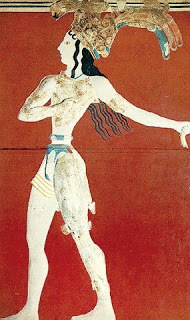
Did the ancient Minoans revere the Goddess to the exclusion of male deities? Was their culture female-centric? In other words, did they embody the opposite of our current civilization? Find the answers to these questions in today's post on the Minoan Path Blog:
Gods and Men in Minoan Spirituality
Published on November 12, 2014 05:29



